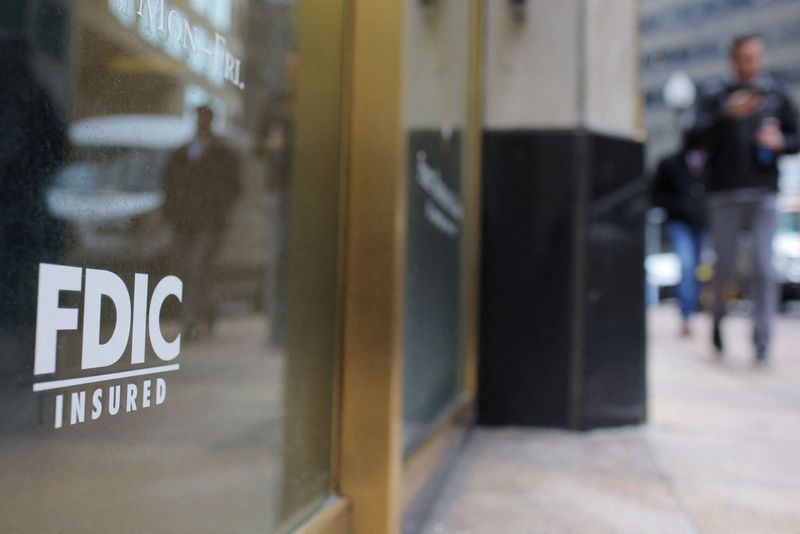By Paritosh Bansal
(Reuters) - Banking regulators have been pushed by market volatility in recent weeks into doing things that they haven't really wanted to do, like letting the largest U.S. bank get even bigger. Their hand may be forced again.
Take the case of the Federal Deposit Insurance Corp (FDIC), one of the main banking regulators. In a December 2021 statement, Chairman Martin Gruenberg said the sale of some troubled banks to the likes of JPMorgan Chase & Co (NYSE:JPM) during the financial crisis of 2008 had arguably "increased long-term financial stability risk."
That had regulators wary of more consolidation. The weekend in March when the FDIC took over Silicon Valley Bank after a run on the lender triggered a broader deposit flight to safety, some of the largest U.S. banks initially got the impression that their bids would not be welcome, according to two sources familiar with the matter.
They weren't allowed into the data room until it was too late to come up with a bid, one of the sources said.
A month and a half later, however, when First Republic Bank (OTC:FRCB) failed, the FDIC had to sell it to JPMorgan as it was the least costly option for the deposit insurance fund.
An FDIC spokesperson said the agency did not exclude the so-called global systemically important banks (G-SIBs) from bidding on Silicon Valley Bank and invited them to do so. The speed of the collapse meant it took the agency some time to set up a data room, delaying the process. The G-SIBs chose not to bid, indicating lack of interest in the asset, the spokesperson said.
Gruenberg did not comment.
A dysfunctional regional banking sector is deeply problematic. These banks provide credit to vast sections of the U.S. economy, and deposit flight has forced them to pull back on lending. Three U.S. banks have collapsed and the shares of some others have been hit in their wake, with the KBW Regional Banking Index down some 30% since March 8.
An uncertain economic outlook on the back of tight monetary policy and other risks, such as falling commercial real estate values and the U.S. debt ceiling debate, are adding to the pressure. Continued stress on these banks could well push the economy into a recession.
GRAPHIC: Overall bank credit https://www.reuters.com/graphics/USA-ECONOMY/BANKS/jnvwyjlokvw/chart.png
Although things have calmed down substantially since March, investors have refused to draw a line under the crisis.
So regulators, bankers and other experts are floating ideas for additional steps Washington could take to stamp out the crisis. These ideas range from accelerating the pace of approvals of bank deals to increasing the deposit guarantees and scrutiny of investors who bet stocks will fall.
But those options either encourage things that regulators don't want, like the creation of bigger banks or irresponsible behavior, or are steps that have not really worked in the past, like restricting short selling, according to banking experts. Some would also require legislative approval, which is hard to do in a divided Congress.
GRAPHIC: Bank tremors and SVB https://www.reuters.com/graphics/USA-FED/BANKS/zgvobeyjmpd/chart.png
That leaves regulators with tools that treat the symptoms, but have unwanted side effects and don't provide the cure.
They have provided banks with lifelines that give them enough cash to meet deposit withdrawals, for example. But the problem now is a crisis of confidence, with some investors questioning the ability of some of these lenders to make money in the longer term.
So as one bank fails, another comes into the market's focus, creating a vicious cycle and putting pressure on regulators to intervene again.

Treasury Secretary Janet Yellen said on Saturday that nearly all banks had access to sufficient liquidity but pressure on earnings may lead to some midsize bank deals.
"That's something I think the regulators will be open to, if it occurs," she said.